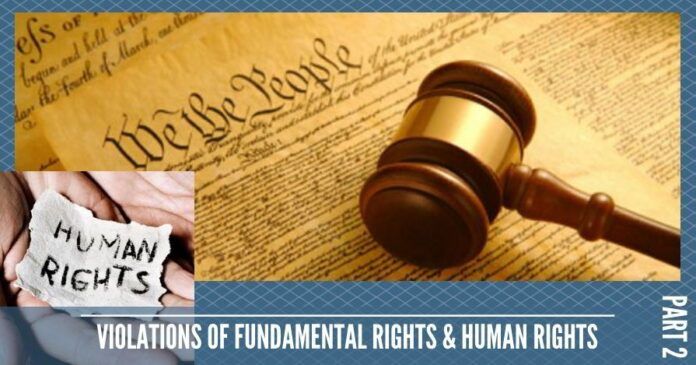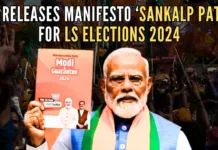
The previous article studies the constitutionality or otherwise of exclusivist systems with respect to certain Fundamental Rights – Article 25, the right to Freedom of conscience and religion, and Articles 14, 15(1) on equality and non-discrimination.
This Annexure is a recall of what the members of the of the Constituent Assembly stated on the record in the Constituent Assembly debates.
CONSTITUENT ASSEMBLY DEBATES (PROCEEDINGS)- VOLUME VII[1]
Tuesday, the 7th December 1948
Mr. Tajamul Husain (Bihar: Muslim): Mr. Vice-President, Sir, I had no intention of speaking on this article but I find that my honorable Friends who have just spoken have been appealing to the minorities. I want to tell the House, Sir, that there is no minority in this country. I do not consider myself a minority. In a secular State, there is no such thing as a minority. I have got the same rights, status, and obligations as anybody else. I wish those who consider themselves as the majority community would forget that there is any minority today in this country. (An honorable member: Hear, hear.) Now, Sir, with regard to Article 20, as far as I understood, my honorable Friend the last speaker wants clause (a) to be deleted. I will just read clause (a) of article 20:–
If you start propagating religion in this country, you will become a nuisance to others. So far it has become a nuisance. – Mr. Tajamul Husain
CONSTITUENT ASSEMBLY OF INDIA DEBATES (PROCEEDINGS)- VOLUME VII
Friday, the 3rd December 1948
Mr. Tajamul Husain: Sir, I beg to move–
“That in clause (1) of article 19, for the words “practice and propagate religion” the words “and practice religion privately” be substituted.”
Sir, under article 19, clause (1) all persons are entitled to freedom of conscience and the right freely to progress, practice, and propagate religion. (I agree, Sir, that people should have the right to freely profess and practice religion, but I am afraid, it will be wrong to allow people to propagate religion in this country.) Sir, my speech will be brief, because I have been seriously ill and I feel the strain while speaking.
I feel, Sir, that religion is a private affair between oneself and his Creator. It has nothing to do with others. My religion is my own belief, and your religion, Sir, is your own belief. Why should you interfere with my religion, and why should I interfere with your religion? Religion is only a means for the attainment of one’s salvation. Supposing I honestly believe that I will attain salvation according to my way of thinking, and according to my religion, and you Sir, honestly believe that you will attain salvation according to your way, then why should I ask you to attain salvation according to my way, or way, should you ask me to attain salvation according to your way? If you accept this proposition, then, why propagate religion?) As I said, religion is between oneself and his God. Then, honestly profess religion and practice it at home. Do not demonstrate it for the sake of propagating. Do not show to the people that this is your religion for the sake of showing. (If you start propagating religion in this country, you will become a nuisance to others.) So far it has become a nuisance.
I submit, Sir, that this is a secular State, and a secular state should not have anything to do with religion. So I would request you to leave me alone, to practice and profess my own religion privately. That is all I wish to say, Sir, because I am not keeping good health. I commend my amendment to the Honourable House and especially to the Honourable Dr Ambedkar, hoping that he will accept it. With these words, I sit down.
If we intend to have one nation, if our idea is to have a secular state it follows inevitably that we cannot afford to recognize minorities based on religion.- Dr. H. C. Mookherjee
CONSTITUENT ASSEMBLY DEBATES (PROCEEDINGS)- VOLUME VII[2]
Tuesday, the 7th December 1948
The Constituent Assembly of India met in the Constitution Hall, New Delhi, at Ten of the Clock, Mr. Vice-President (Dr. H. C. Mookherjee) in the Chair.
DRAFT CONSTITUTION -(Contd.)
Article 20
The Honourable Dr. B. R. Ambedkar: Mr. Vice-President, Sir, out of the amendments that have been moved, I can persuade myself to accept only amendment No. 661 moved by Mr. Kapoor to omit sub-clause (3) from the article, and I am sorry that I cannot accept the other amendments.
Now, I take the liberty of saying that the draft as it stands, strikes the mean, which I hope will be acceptable to the House. There are three reasons, in my judgment, which militate against the acceptance of the view advocated by my friend Mr. Ismail, namely that there ought to be no ban on religious instructions, rather than religious instructions should be provided; and I shall state those reasons very briefly.
The third thing which I would like to mention in this connection is that unfortunately, the religions which prevail in this country are not merely non-social; so far as their mutual relations are concerned, they are anti-social, one religion claiming that its teachings constitute the only right path for salvation, that all other religions are wrong. The Muslims believe that anyone who does not believe in the dogma of Islam is a fakir not entitled to brotherly treatment with the Muslims. The Christians have a similar belief. In view of this, it seems to me that we should be considerably disturbing the peaceful atmosphere of an institution if these controversies with regard to the truthful character of any particular religion and the erroneous character of the other were brought into juxtaposition in the school itself. I, therefore, say that in laying down in article 22 (1) that in State institutions there shall be no religious instruction, we have in my judgment traveled the path of complete safety.
CONSTITUENT ASSEMBLY DEBATES (PROCEEDINGS)- VOLUME VIII[3]
Wednesday, the 25th May 1949
The Constituent Assembly of India met in the Constitution Hall, New Delhi, at Eight of the Clock, Mr. President (The Honourable Dr. Rajendra Prasad) in the Chair.
INDIA (CENTRAL GOVERNMENT AND LEGISLATURE) (AMENDMENT) BILL
Dr. H. C. Mookherjee (West Bengal: General): Sir, in considering whether the House should accept the recommendations of the Advisory Committee and the resolution placed before it by Sardar Patel there are two questions which, it seems to me, the House should ask itself. The first is: are we really honest when we say that we are seeking to establish a secular state? And the second is, whether we intend to have one nation if our idea is to have a secular state it follows inevitably that we cannot afford to recognize minorities based on religion. This to my mind is the strongest possible argument why reservation of seats for religious groups should be abolished and that immediately. So far as the idea of building up one nation is concerned I do admit that there are certain economically backward groups in every community and for them, provision has been made in the directive adopted in December last.
Sir, these things undoubtedly show that the minorities have nothing to fear from the majority community. I am firmly convinced from my own experience that it is the path of wisdom for the minorities to trust the majority community that if they want to live in peace and honor in this country, they must win its good-will. Our attitude in the past has not been very helpful. I do not want to go into details, but everybody will admit that the attitude of the minorities has not been at all helpful. Let us recollect how many times we used back-door influence in order to sabotage our nationalist movement. I shall not go beyond that. To the majority, I say: “Once for all, we are placing the responsibility of looking after us fairly and squarely on your shoulders.” This is an opportunity which Providence has given to the majority community to prove by actual work, to prove by actual example that the protestations made so far are genuine and personally I have every reason to believe that they will not be found wanting.
The brotherhood of Islam is not the universal brotherhood of man. It is a brotherhood of Muslims for Muslims only.
APPENDIX B
Report of the Special Sub-Committee referred to in paragraph 4 of the Advisory Committee’s Report
We feel convinced that if we are to build a strong State which will hold together in times of peace and war, of prosperity and adversity, the Constitution should contain no provision which would have the effect of isolating any section of the people from the mainstream of public life. In this connection, we would recall the following resolution passed by the Constituent Assembly at its meeting on the 3 April 1948:
“Whereas it is essential for the proper functioning of democracy and the growth of national unity and solidarity that communalism should be eliminated from Indian life, this Assembly is of opinion that no communal organisation which by its constitution or by the exercise of discretionary power vested in any of its officers or organs, admits to or excludes from its membership persons on grounds of religion, race and caste, or any of them, should be permitted to engage in any activities other than those essential for the bona fide religious, cultural, social and educational needs of the community, and that all steps, legislative and administrative, necessary to prevent such activities should be taken.”
Pakistan or Partition of India[4]
By BR Ambedkar
“Hinduism is said to divide people and in contrast, Islam is said to bind people together. This is only a half-truth. For Islam divides as inexorably as it binds. Islam is a close corporation and the distinction that it makes between Muslims and non-Muslims is a very real, very positive and very alienating distinction. The brotherhood of Islam is not the universal brotherhood of man. It is a brotherhood of Muslims for Muslims only. There is a fraternity, but its benefit is confined to those within that corporation. For those who are outside the corporation, there is nothing but contempt and enmity. The second defect of Islam is that it is a system of social self-government and is incompatible with local self-government because the allegiance of a Muslim does not rest on his domicile in the country which is his but on the faith to which he belongs. To the Muslim ibi bene ibi patria [Where it is well with me, there is my country] is unthinkable. Wherever there is the rule of Islam, there is his own country. In other words, Islam can never allow a true Muslim to adopt India as his motherland and regard a Hindu as his kith and kin.”
Note:
1. The views expressed here are those of the author and do not necessarily represent or reflect the views of PGurus.
References:
[1] CONSTITUENT ASSEMBLY DEBATES (PROCEEDINGS)- VOLUME VII Tuesday, the 7th December 1948
[2] CONSTITUENT ASSEMBLY DEBATES (PROCEEDINGS)- VOLUME VII Tuesday, the 7th December 1948
[3]CONSTITUENT ASSEMBLY DEBATES (PROCEEDINGS)- VOLUME VIII Wednesday, the 25th May 1949
[4] DR. Babasahed Ambedkar Writings and Speeches VOL. 8
- On Certain Systems and their Violations – Constituent Assembly Debates – Part 2 - October 1, 2018
- On certain systems and their violations of fundamental rights and human rights - September 29, 2018











This is gold. Loved reading this. I may have never gotten this had you not found this. Keep up with the research Pankaj, these are gems easy to never see in life.
Ambedkar keeps getting my respect. Close to being the only one wanting and upholding Liberty, in those times.